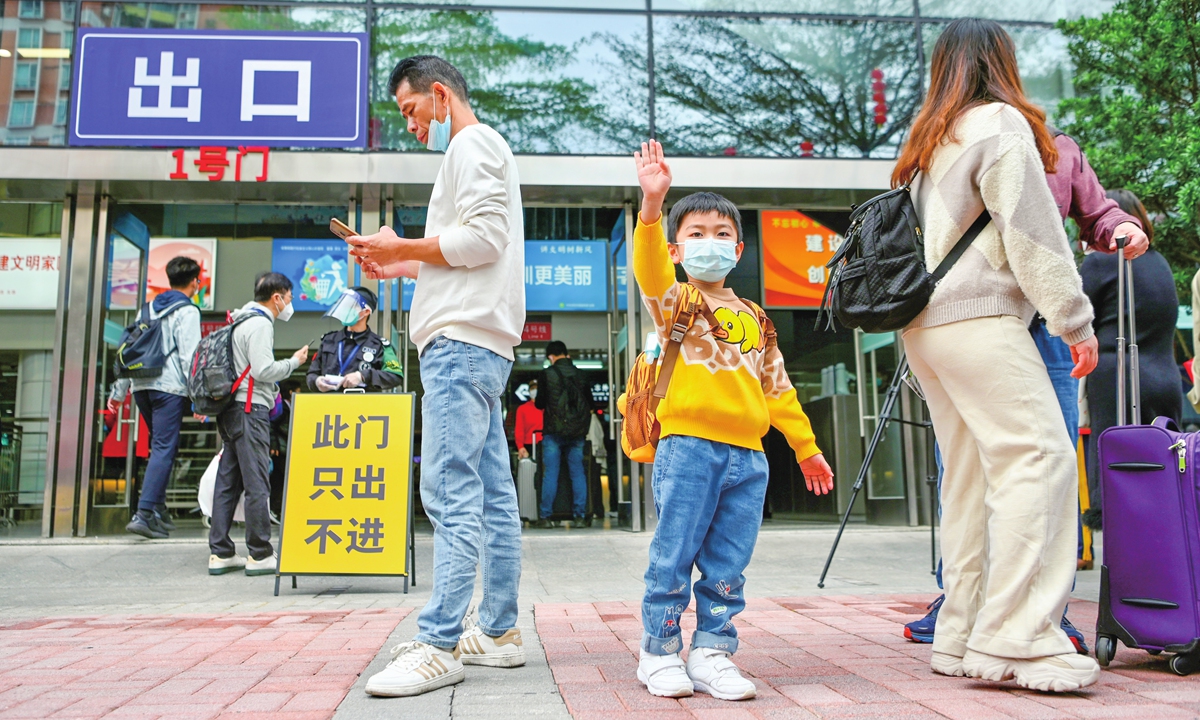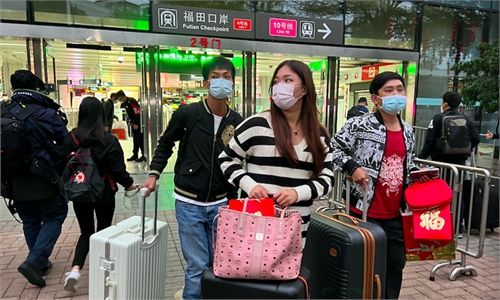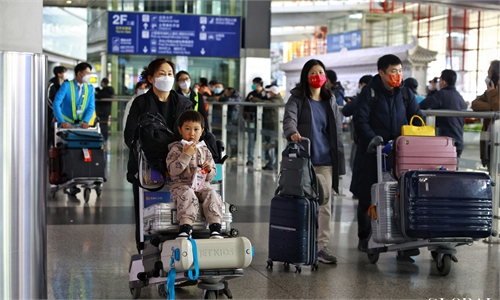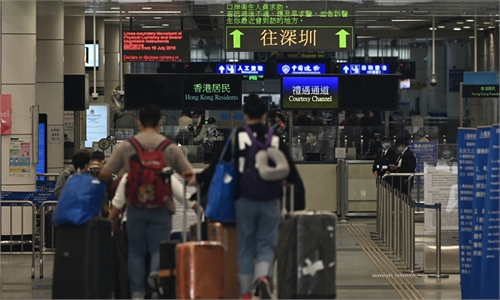Exclusive: Border reopening a New Year's gift for HK: official from Trade Development Council

A child from Hong Kong waves to the camera when he arrives at the Futian port in Shenzhen, South China's Guangdong Province on January 8, 2023. Photo: VCG
The border reopening after three years of closure allows Hong Kong and the Chinese mainland to better work on the high-quality integration of the Greater Bay Area (GBA), as a force of synergy toward the common goal has gradually formed between the two sides over the years, an official from the Hong Kong Trade Development Council (HKTDC) said.Jim Zeng, the regional director of the Council based in Shenzhen, made the remarks in an exclusive interview with the Global Times on Sunday.
"It's not so much saying the border reopening is a New Year's gift for Hong Kong residents as it is saying it's a gift for Shenzhen residents, and also for the Guangdong-Hong Kong-Macao Greater Bay Area and even the entire mainland," Zeng said.
Three years on, the border closure due to the fight against the COVID-19 has affected the city's jewelry industry, consumer electronics and many other traditional businesses very much. The closure also forced the suspension of international activities and conferences where businessmen seek opportunities to expand their businesses, according to Zeng.
Border reopening allows Hong Kong and the mainland to better work on the high-quality integration of the GBA, he said.
The ideology of binding Hong Kong and Shenzhen, the two major metropolitan cities, as one can also be implemented, so as to push for the early implementation of Hong Kong's programs related to enterprises, universities and research institutes, which have been slowly developed in recent years, the official added.
"Over the years, I feel that a force of synergy toward the common goal has gradually formed between the two sides," the official said. "First of all, it is the current competent Hong Kong Special Administrative Region's government that allows Hong Kong to activate itself and achieve a resonation with the GBA in many aspects."
Hong Kong has experienced a historical turning point since its celebration of the 25th anniversary of its return to the motherland, especially after Hong Kong Chief Executive John Lee took office and issued the "result-oriented" and "solution-driven" policy address, Zeng noted.
His policy address responded to many questions that trouble the city, including rolling out a series of measures in regard to attracting global talent, enhancing the city's competitiveness as an international financial hub, and further integrating into the country's overall development plan.
Some of the 180-degree turns in ideas and practical concepts on how to develop Hong Kong within the Youth Development Blueprint issued in December 2022 are beyond the expectations of many, including the unprecedented move of the setting up of the Hong Kong New Investments Corp to consolidate the Hong Kong growth portfolio, the GBA investment fund, and so on, in order to promote the development of industries and the economy, Zeng noted.
He said that the blueprint is intended to create an atmosphere of scientific and technological innovation in Hong Kong society, encouraging children to study science and engineering in college, and offering them great employment opportunities in both Hong Kong and the GBA.
As Hong Kong integrates into the country's overall development plan, the city has its own role to play, Zeng believes.
Hong Kong could play a good role of being an international partner, inviting leading overseas technology enterprises to the city and connecting with technology enterprises in the mainland. Hong Kong can become the international headquarters for Chinese enterprises' investment and trade in Belt and Road Initiative economies, for example, he said.
Zeng highlighted the necessity for both sides to work together and cooperate, giving up the conventional idea of seeing each other as just an outside investor.
Though Hong Kong has strong capability in basic research and development, its weakness in terms of how to commercialize scientific research achievements is also apparent, and this is where the GBA can play its role.
The HKTDC has mapped out business activities, such as holding seminars for Hong Kong enterprises to better understand the development opportunities of the GBA, helping them connect with new media and new retail to expand the domestic market and prompting Hong Kong's leading international service sectors to work in the mainland, Zeng told the Global Times.
In a complex international situation where the country is confronted with the epidemic, regional conflicts, trade wars and technological wars, how can Hong Kong cooperate with the mainland to foster Chinese multinational enterprises in the future is a question to be discussed, he said.
"Nothing in the world can always go smoothly, neither the world economy nor social development. There are twists and turns," he said, shrugging off an international index that indicates a setback in Hong Kong's economy.
"Those technical indexes really don't matter as long as there is adequate confidence toward Hong Kong. No doubt I see strong confidence toward a fresh new and innovative Hong Kong starting from 2023, no matter whether it's from my personal perspective, or the society of Shenzhen and Hong Kong, or friends and enterprises from the two places."
The One Country, Two Systems policy remains the biggest advantage of Hong Kong, which will make it hard to replace, he said.
"Those rankings reflect what the city used to be. What we need to focus on is Hong Kong's future. In five to 10 years, a new Hong Kong, an innovation-driven Hong Kong will stand in the world … If Hong Kong has a calling card, it must be finance, and we hope that the second calling card of Hong Kong will be science, technology and innovation," Zeng noted.
"What I see for the city in the future is a place with an innovative ecology, and highly appealing to international scientific and technological talent, and top professors in R&D teams. That's Hong Kong's future."




